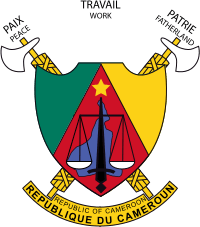National Assembly (Cameroon)
| National Assembly Assemblée nationale | |
|---|---|
 | |
| Type | |
| Type | |
| Structure | |
| Seats | 180 members |
_diagram.svg.png) | |
Political groups |
Government (148)
Opposition (32) |
| Meeting place | |
| Yaoundé | |
| Website | |
|
www | |
 |
| This article is part of a series on the politics and government of Cameroon |
|
Government |
| Foreign relations |
The National Assembly (French: Assemblée Nationale) is the lower house of the Parliament of Cameroon. It has 180 members, elected for five-year terms in 49 single and multi-seat constituencies.
Although multiparty elections have been held since 1992, the Cameroon People's Democratic Movement (RDPC) has always retained control of the National Assembly. The Cameroonian political system invests overwhelming power in the hands of the President of the Republic, Paul Biya, and the RDPC exists essentially to support Biya and his policies. As a result, the National Assembly does little more than approve Biya's policies.
From 1992 to 1997, the RDPC relied on alliances with two smaller parties to secure a parliamentary majority. Beginning in 1997, the RDPC has won an outright majority in each election; its majorities have consistently improved as the opposition has weakened. Prior to 2013 and the creation of the Senate, the National Assembly was a unicameral chamber.
2008 constitutional changes
On 10 April 2008, the National Assembly overwhelmingly voted a bill to change the Constitution of Cameroon to provide the President of the Republic with immunity from prosecution for official acts and to allow him to run for an unlimited number of seven-year terms (it was previously limited to two terms) along with a number of other changes. The changes took place after a walk-out of the National Assembly by the opposition SDF representatives and just one month after widespread violence resulting in dozens of deaths and hundreds of arrests protesting price rises and the proposed constitutional changes.[1][2] Five members of parliament voted against the bill. Opposition lawmakers[3] and at least one deputy from the ruling RDPC, Paul Abine Ayah, criticised the bill as a setback for democracy and the country in general.[4]
See also
- List of Presidents of the National Assembly of Cameroon
- Politics of Cameroon
- List of legislatures by country
References
- ↑ Cameroon assembly clears way for Biya third term
- ↑ "Cameroon clears way for third term". Television New Zealand. Reuters. 11 April 2008. Retrieved 27 October 2011.
- ↑ Cameroon parliament extends Biya's term limit
- ↑ Cameroun Republic's Constitutional Amendment Debacle: MP from Akwaya, Hon. Paul Abine Ayah, Declares that "it will take us back 200 years."